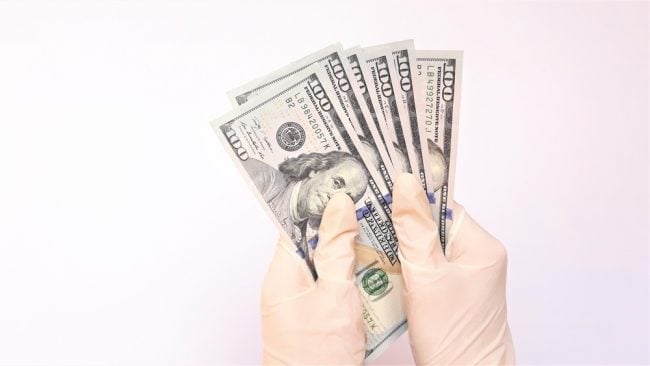 Source: Shutterstock
Source: Shutterstock
Depending on where you live, congratulations, your state is reopening! Go get your nails done! Or, for the others, sorry for your continued shelter-in-place orders. Please continue working from home and worrying if and when your dog will bark while you're making a presentation.
For those of us who are in an "Open-for-Business" state, we can go to the dentist again. So, there's that. Do they offer curbside Novocain? If so, I'll have a large.
The downside is that some dentist offices are charging a "Coronavirus Cleaning Fee" that is not covered by insurance. It's all the pleasure of going to the dentist with the added feature of extra out-of-pocket costs.
Sorry dentist, I'm not ready to reschedule my appointment from April.
Let's talk about these what feel like opportunistic fees for a moment, in a time when the economy is, I don't know, garbage? Unemployment and job-loss numbers are at such incredible and unnerving levels that it feels like we are living in one of David Lynch's surreal movies or TV shows every single day. I mean, we wake up each morning knowing Laura Palmer was murdered and we don't trust any of the people in the town.
There are some companies, other than my dentist, that appear to be tacking on some new fees because … they can?
Let's go down to Tallahassee, Fla. Earlier this month, it was reported on WTXL-TV, "north Florida and south Georgia's local news station," that a property management group of an apartment complex added "sanitizing fees" to tenants' monthly bill. According to reports, tenants were to pay somewhere between $40 and $65 each month as stated in a letter from the management company. Obviously some tenants were upset about being charged extra due to the above-stated economic and unemployment reasons. In the report from north Florida and south Georgia's local news team, once a reporter got in touch with the property management group, a spokesperson said the coronavirus cleaning service fees were really an optional thing to pay. Well, the dummy tenants must have read that letter wrong. Even though WTXL's story stated that the optional payment of the fee was not clear at all in the property management's letter. Glad they got that cleared up and that a business wasn't really trying to screw over people – they were just making it seem like tenants needed to pay. Consumers really need to trust businesses to do the right thing, especially now. To be clear, that was sarcasm.
Food-delivery platforms like Grubhub, Uber Eats and Postmates are facing a class-action lawsuit for the delivery fees they charge restaurants in New Jersey. By law, these platforms can charge between 15% and 35% for their services. And guess what? During the state of emergency, they've opted to charge the highest amount, 35%. According to the New York Times, these fees can add an extra 91% to the normal menu-priced cost of the food delivered. The upside is, you can get some great tamales delivered right to your sheltered-in-place self. The downside is, you just paid $80 for some tamales, refried beans and rice.
College and university students are filing lawsuits against their schools because they can't get their money back for services they paid for even after schools shut down because of the coronavirus.
For instance, let's look at Bowling Green State University. Really, look at it. Because it's pretty much the only thing you'll see driving on I-75 between Toledo and Findlay, Ohio.
Like most other students around the country, BGSU students were shoved into the new reality of online-only classes. On-campus students, now off-campus students, had paid for tuition, room and board, meal plans, parking and athletic fees. And like most other universities and colleges, the administration decided to not refund those items, with one exception – a prorated refund for parking. According to a column by the Toledo Blade editorial board, the university's president said, "We thought it's only fair that if the students aren't here they shouldn't be charged for parking."
That's some interesting logic that apparently doesn't apply to housing costs or fees paid for the campus fitness centers – all of which are still closed.
These three examples all revolve around this idea: The rules have changed and who gets to make the new rules?
The upside is, rules are out the window-ish, so let's make some new ones. The downside is, unless you are a powerful industry lobbyist or billionaire, you probably aren't going to be making any of the new rules.
The system is broken. But those who are in charge really like the old system, and they would rather fix what has broken rather than creating a new way of living, learning and going to the dentist. They are fighting to bring things back to how they were because these people and organizations made a lot of money from the pre-broken system. Don't worry, they're still making loads of money. Economic numbers just a few weeks ago showed that American billionaires have made another $280 billion since the pandemic began, as reported by Forbes.
There is an idea floating around Washington, D.C., these days to leave the banking industry out of any plan to deliver stimulus money to citizens. Some Democrats would like to see the Fed create accounts for everyone to deliver the money directly to people's accounts. According to reporting by the New York Times, one Republican Senator, whose main political contributors come from the banking industry, said, "I would hate to take it away from banks and try something else that we haven't tried yet." OK, sir. Let's try something we haven't tried yet inside the broken system. What do you suggest?
I feel like credit unions are in a prime position to help rewrite these rules. No one, except your local businesses, is more connected and tied into the community than you are. It's actually kind of inspiring to think about a financial institution right now that has the ability to give such a large amount of care to an individual community, as credit unions do. That might just be a silver lining I'm desperately looking for. If so, I'll take it.
Because the upside to everything right now is that the downside isn't that far down anymore.
 Michael Ogden
Michael OgdenMichael Ogden is editor-in-chief for CU Times. He can be reached at [email protected].
© Touchpoint Markets, All Rights Reserved. Request academic re-use from www.copyright.com. All other uses, submit a request to [email protected]. For more inforrmation visit Asset & Logo Licensing.







